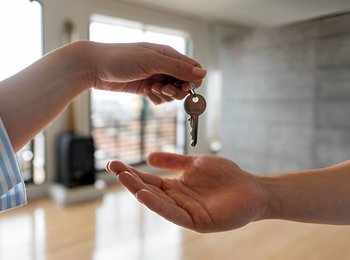Tenant FAQs
1. What is a holding deposit?
A holding deposit is a small payment you pay to a landlord or letting agent to reserve a rental property before signing the tenancy agreement.
2. How much is a holding deposit?
The holding deposit can't be more than 1 week's rent. You pay it after your tenancy application is approved, and it’s then deducted from your first month’s rent when you start your tenancy.
3. Can a holding deposit be refunded?
Yes, the holding deposit is refunded to tenants if the tenancy doesn’t go ahead. But it can be kept by the landlord if a tenant provides false information, pulls out of the tenancy without a valid reason, or fails to meet referencing requirements.
4. What’s the difference between a holding deposit and a security deposit?
The holding deposit is the amount you pay before becoming a tenant to reserve the property, and the security deposit is the amount you pay before moving in and is held throughout the tenancy to cover any damage or unpaid rent at the end of your tenancy.
5. How is a security deposit calculated?
A security deposit is 5 weeks’ rent.
To calculate it, you can use this simple formula:
Monthly rent × 12 ÷ 52 × 5
For example, if your rent is £1,000 per month, your security deposit would be:
£1,000 × 12 ÷ 52 × 5 = £1,154
6. Is there any option to paying a deposit?
Yes! If you don’t want to pay a full deposit, Goodlord and Housing Hand offer solutions that cover the deposit for you. They provide guarantor services for students or professionals who either don’t meet the usual income requirements or prefer not to pay a lump sum deposit.
7. Can I pay a holding deposit without viewing?
No, most agents require you to view the property first to confirm you’re satisfied with it before paying a holding deposit.
8. What will I be referenced on as a tenant?
Tenant referencing
-
Verifies your income
-
Looks at your rental history
-
Checks for any County Court Judgments (CCJs).
9. Can I pay my annual rent in advance if I don’t have a guarantor?
Yes. Landlords may allow you to pay a year’s rent upfront, but under the upcoming Renters Reform Bill, this may no longer be allowed, so it’s best to check with your agent before making any arrangements.
10. Can I negotiate the rent for a property I see online?
Yes, you can negotiate on the rent but remember the landlord doesn’t have to agree.
11. What are letting agency fees?
At Cambridge Property Lettings, we don’t charge tenants for any application or hidden fees.
12. Are bills included in the rent?
Generally,no. Bills aren’t included in the rent. But some landlords may include certain bills, such as water, so it’s a good to confirm what’s included with your landlord or agent before moving in.
13. Can I get a rent reduction or sublet if I’m away for a few months?
No.
14. Can I sublet my rental property?
No, subletting is not allowed.
15. How long does it take to return my security deposit?
Usually within 10 days of end of tenancy; and after any deductions are agreed, Tenancy Dispute service releases funds within 2–3 days.
16. What can I do if I disagree with a deposit deduction?
If you don’t agree with any deductions from your deposit, you can raise the issue with your landlord or letting agent to try and resolve it directly. If that doesn’t work, you can submit a dispute through the TDS (Tenancy Deposit Scheme), which will review the case and help reach a fair decision.
17. If another tenant damages the property, will it affect my deposit?
Yes. In a joint tenancy, all tenants are equally responsible, so any damage caused by one tenant could be deducted from everyone’s deposit.
18.If the fridge stops working, do I replace it?
No, you don’t need to replace it. If the fridge is included in the inventory, it’s the landlord’s responsibility to repair or replace it.
19. Do tenants have to take care of the garden?
Yes, tenants are expected to maintain the garden. But it’s always best to check your tenancy agreement, as responsibilities can vary depending on the property and landlord, as some properties come with gardening service.
20. Do tenants have to clean outside windows?
Yes, tenants are responsible for cleaning exterior windows, unless the tenancy agreement specifically includes block window cleaning.
21. Can I drill holes or hang things on the walls?
No, you cannot drill holes. But you can hang things using adhesive hooks or strips that won’t leave marks.
22. Can tenants remove furniture or appliances from rental property?
Tenants can only remove furniture or appliances if the landlord agrees. But this is done at the tenant’s cost, and the landlord require the items returned in the same condition at the end of the tenancy.
23. What should I do if I’m going on holiday for a month?
If you’re away for a month, inform your landlord or letting agent. They may need to arrange a property check every 28 days to meet insurance requirements.
24.Can my landlord or letting agent visit the property whenever they want?
No, landlords and agents must give at least 24 hours’ notice before visiting, except in emergencies.
25. Can I have extra keys made for my rental property?
Yes, you can get extra keys unless your tenancy agreement prohibits it. Just make sure to return all keys to the landlord or your agent when your tenancy ends.
26. What should I do if there’s an emergency in my rental property?
For tenants renting through Cambridge Letting Agents, in case of emergencies report using the Street App. You can describe the issue and upload details directly in the app, allowing the team to arrange repairs or support.
27. What should I do if the agency isn’t available at the weekend?
If you’re renting with Cambridge Letting Agents, you can use the out-of-hours contact number provided at the start of your tenancy.
28. Does the property need to be professionally cleaned at the end of the tenancy?
No, it doesn’t have to be professionally cleaned. It needs to be left in a clean, move-in-ready condition.
29. Do you have properties with disabled access or parking?
It’s always good to ask the letting agent directly. They can let you know which properties have accessible features or dedicated parking spaces to suit your needs.
30. Can I rent a property without furniture?
It’s usually unlikely, but it’s always worth asking the landlord or your agent.
31. What insurance do I need as a tenant?
You need contents insurance to protect your belongings and accidental damage insurance in case you break or damage something in the property by mistake.
32. What should I do if I receive mail addressed to someone else?
If you get mail that isn’t in your name, don’t open it. Let your landlord or agent know so they can make sure it reaches the right person.
33. Can I change my utility provider during tenancy?
Yes, you can switch the provider. Just make sure to let your landlord or agent know before making any changes.
34. Do I need to be there for the property check-out?
No, you don’t have to be present for the check-out. The landlord or your agent can carry out the inspection on your behalf.






